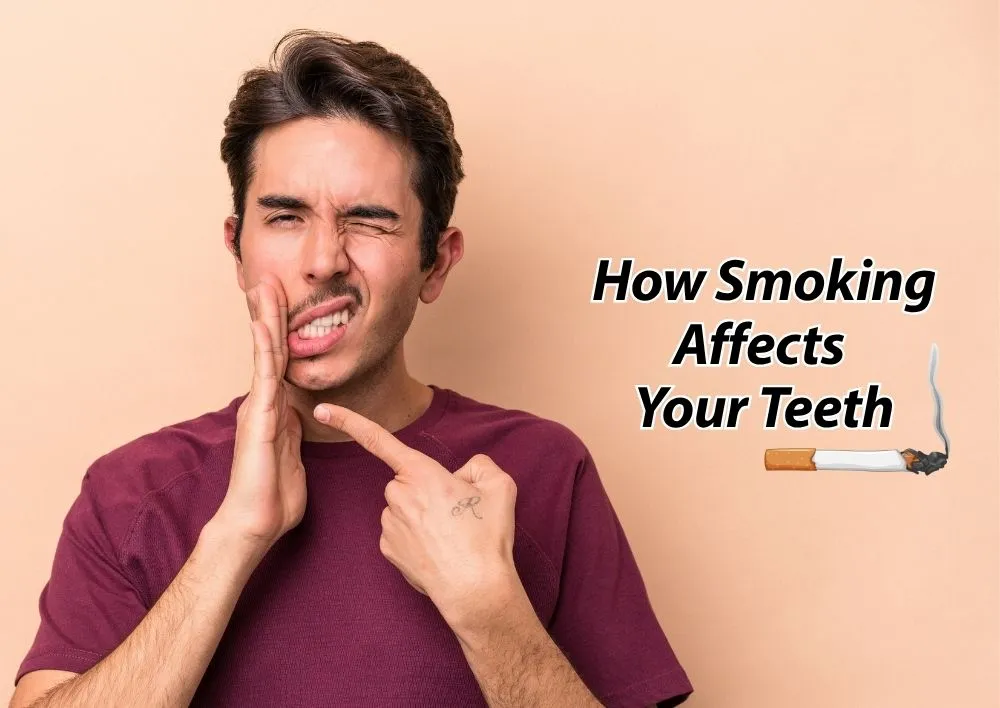How Smoking Affects Your Teeth: Hidden Dangers You Should Know
Summary
When most people think about the dangers of smoking, they just think of lung or heart diseases. But did you know that smoking can also seriously damage your teeth and gums, too? From stained teeth and bad breath to gum infections and tooth loss, smoking affects your entire mouth. Understanding these effects can help you make better choices for your oral and overall health. In this blog, we will explore how smoking affects your teeth, the hidden oral health problems it causes, and why quitting can make a massive difference for your smile and overall well-being.
7 Ways Smoking Affects Your Teeth and Oral Health:
1. Stained and Discolored Teeth
One of the first visible effects of smoking is tooth discoloration. Cigarettes contain nicotine and tar, which easily stick to the enamel, the outer layer of your teeth.
Nicotine, when mixed with oxygen, turns yellow and causes stains.
Tar, a dark substance, adds brownish marks to the teeth.
Even with regular brushing, these stains can be tough to remove. Smokers usually notice that their teeth lose their natural shine and appear dull over time. Professional teeth cleaning or whitening can help, but the stains often return if smoking continues.
Dr. Vishwas Bhatia, senior dentist in Gurgaon at Miracles Mediclinic, explains, “Nicotine and tar not only discolor your teeth but also weaken the enamel over time. Once the enamel becomes porous, it attracts more stains and bacteria, making it harder to maintain a healthy, white smile.”
2. Bad Breath (Halitosis)
Smoking leaves behind a constant odor in your mouth, lungs, and even on your breath. The chemicals in tobacco reduce saliva flow, creating a dry environment that allows bacteria to thrive.
Saliva is important for washing away food particles and neutralizing acids. Without enough saliva, your mouth becomes dry and more prone to bacterial buildup, leading to chronic bad breath, a condition that even mints or mouthwash can’t completely fix.
Over time, this dryness and bacterial growth not only cause unpleasant breath but also contribute to several dental problems, including tooth decay, gum infections, and plaque buildup.
3. Gum Disease (Periodontal Disease)
Smoking is one of the leading causes of gum disease, also known as periodontitis. The chemicals in tobacco affect the attachment of soft tissue and bone to your teeth, making it easier for bacteria to settle in the gums and harm your overall oral health.
Here is how smoking harms your gums:
-
It reduces blood flow to gum tissues, slowing healing.
-
It weakens the immune system, making it harder to fight infections.
-
It masks early signs of gum disease like bleeding, so the problem often goes unnoticed until it becomes severe.
Over time, this leads to swollen, receding gums, loose teeth, and even tooth loss if not treated promptly. Maintaining good oral health and visiting your dentist regularly can help detect and manage gum problems early.
4. Delayed Healing After Dental Procedures
If you are a smoker, your dentist might warn you that healing after tooth extractions, gum surgeries, or implants may take longer. Nicotine narrows blood vessels, reducing oxygen supply to tissues. This delay in healing increases the risk of infection and implant failure.
For example, smokers have a much higher risk of developing a painful condition called dry socket after a tooth extraction, which can make recovery uncomfortable and slow.
5. Increased Risk of Oral Cancer
One of the most serious consequences of smoking is the increased chance of oral cancer. Tobacco contains more than 7,000 chemicals, many of which are carcinogenic. Smoking can cause cancer of the:
-
Lips
-
Tongue
-
Cheeks
-
Gums
-
Throat
Symptoms like persistent mouth sores, lumps, or difficulty swallowing should never be ignored. Regular dental check-ups can help detect these signs early, improving the chances of successful treatment.
6. Tooth Sensitivity and Decay
Smokers often experience tooth sensitivity due to gum recession and enamel damage. When gums pull back, they expose the sensitive roots of teeth, making them more prone to pain from hot, cold, or sweet foods.
Additionally, smoking decreases the mouth’s ability to fight bacteria, leading to plaque buildup. Over time, this results in cavities, decay, and enamel erosion, which can cause further discomfort and damage.
7. Altered Taste and Smell
Smoking dulls your senses, especially taste and smell. The chemicals in cigarettes affect the taste buds and nasal passages, making it harder to enjoy your favorite foods. Many smokers find that food tastes bland or less appealing.
Interestingly, after quitting smoking, many people report that their sense of taste and smell improves within just a few weeks, one of the early rewards of giving up tobacco.
How Quitting Smoking Can Improve Oral Health
It is never too late to reverse the damage to teeth. Once you stop smoking, your mouth begins to heal. Here is what happens when you quit:
-
Your breath becomes fresher.
-
Gum health improves as blood flow returns to normal.
-
Stains lighten slowly, especially with professional cleaning.
-
The risk of oral cancer and gum disease starts to drop.
Dentists usually recommend combining professional dental care with healthy habits like brushing twice daily, flossing, and using mouthwash to speed up recovery.
Tips to Protect Your Teeth If You Smoke
If quitting feels difficult, you can still take steps to reduce the harm:
-
Don't forget to brush your teeth twice a day with fluoride toothpaste.
-
Floss daily to remove plaque and food particles.
-
Rinse with an antibacterial mouthwash.
-
Drink plenty of water to prevent dry mouth.
-
Visit your dentist every 6 months for cleaning and check-ups.
-
Consider professional teeth whitening for stains.
However, the best step for your oral hygiene and overall health remains quitting smoking altogether.
Conclusion:
Smoking affects far more than your lungs; it leaves a lasting impact on your teeth, gums, and overall oral health. From yellow stains and bad breath to gum disease and tooth loss, the damage can be both visible and invisible. The moment you decide to quit, your body and your smile begin to heal. So, take that first step today. Your teeth will thank you with every bright, healthy smile ahead. Ready to give your smile a fresh start? Schedule a consultation with a renowned dentist near you to assess your oral health and get expert guidance on quitting smoking and restoring your dental health.
Frequently Asked Questions
Yes, your teeth and gums can partially recover once you quit smoking. Stains may fade, gum health can improve, and your mouth’s ability to heal increases over time.
Yes, a dentist can help by performing professional cleaning, whitening, and treating gum disease or decay caused by smoking.
It is normal; your body is still adjusting as it detoxifies from nicotine. Temporary fatigue, mood changes, or cravings may occur before full recovery.
Brush twice daily, floss regularly, use mouthwash, drink water often, and visit your dentist every 6 months to reduce damage.
The effects can begin within months of regular smoking, and stains, bad breath, and gum irritation may appear early, worsening over time with continued use.







_Causes,_Symptoms_Effective_Management_Tips.webp)








Was the information useful?
0 0